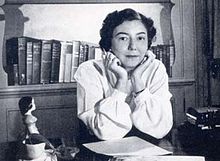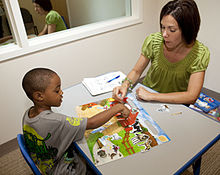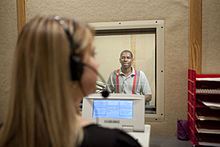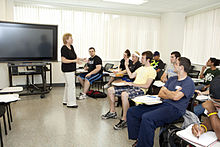- Cleveland Hearing & Speech Center
-
Cleveland Hearing & Speech Center (CHSC) is a non-profit (501(c)3) organization based in Cleveland, Ohio specializing in providing hearing services, speech-language and learning, and interpreting and advocacy services through its Community Center for the Deaf and Hard of Hearing program. In addition to its main headquarters in University Circle, it also has satellite offices in South Euclid, Ohio, Broadview Heights, Ohio, and Lorain, Ohio. On average, nearly 10,000 children and adults come to the Center each year seeking help to overcome their communication obstacles.
Contents
Mission
To serve, advocate for, and empower individuals with diverse communication abilities and to increase public awareness and sensitivity about hearing loss, deafness, speech-language, and related literacy issues.
Early history
 Helen Newell Garfield
Helen Newell Garfield
The origins of Cleveland Hearing & Speech Center date back to 1914 when various Cleveland-based lip-reading clubs were started by some of the Center's original founding members. From 1921 to 1930, under the leadership of Mrs. Helen Newell Garfield, the daughter-in-law of the late United States President James A. Garfield, a number of these clubs were consolidated into one unified organization with the primary focus of providing lip-reading services for adults. Through the 1930s and early 1940s, the organization was called the Cleveland Association of the Hard of Hearing. Under the leadership of James E. Garfield and Marie Hays Heiner, it expanded its scope of services when hearing services for children were added.
In 1945, the organization merged with the speech clinic at Western Reserve University. This new organization, renamed Cleveland Hearing & Speech Center, moved to a University owned house (the former School of Architecture) at 11206 Euclid Avenue, which was aptly named Garfield House. The organization was incorporated on January 8, 1946. CHSCs affiliation with Case Western Reserve University's Department of Communication Sciences remains in place today; the department is housed in CHSCs University Circle building, and CHSC provides clinical training to the departments graduate students.
In 1953, as CHSC continued to expand services, a building addition was added. In 1965, the original Garfield House was razed to make room for a modern facility.
Programs and services
CHSC has since continued to broaden its scope of specialized services to Northeast Ohioans with special communication needs, adding the Community Services for the Deaf and Hard of Hearing program in 1975 and the Regional Infant Hearing Program in 2001.
CHSCs four principal program areas are Speech-Language Pathology, Audiology, Community Center for the Deaf and Hard of Hearing (CCDHH), and the Regional Infant Hearing Program (RIHP). All programs follow CHSCs guiding principle to serve as many people as possible regardless of their inability to pay, and also serve the community through outreach/education programs, support groups, and student training.
Speech-Language Pathology
CHSCs Speech-Language Pathology team provides evaluation and treatment for communication problems associated with language learning disabilities, severe speech sound production disorders, neurological problems, stuttering, and voice disorders. CHSC offers speech-language services in community-based settings such as schools, day care centers, and multiple sites of the Head Start program. Clients also receive services in CHSCs offices in Cleveland (University Circle) and surrounding communities (South Euclid and Broadview Heights).
CHSC holds certification to offer specialized speech-language treatments and devices, such as the Lee Silverman Voice Treatment (LSVT) program to improve communication in individuals with Parkinson Disease, and the SpeechEasy device, an instrument that promotes speech fluency in some individuals who stutter. CHSC also dispenses augmentative and alternative communication devices for people who cannot communicate verbally; a loaner program makes these devices available on a trial basis prior to purchase.
CHSC offers a weekly support group for people dealing with speech-language problems resulting from stroke, head injury, and other neurological conditions. Therapy groups providing effective speech-language treatment for persons with Down syndrome, Asperger syndrome, autism, and stuttering are also offered by CHSC.
Audiology
CHSCs Audiology team provides hearing screenings and evaluations, hearing aid and assistive listening device fitting, and consultation on advanced hearing aid technology. The Audiology program operates in CHSCs University Circle, South Euclid, and Broadview Heights office locations. It also provides services in other community settings such as health fairs and nursing homes.
One in every ten (28 million) Americans has hearing loss; 30% of these individuals do not use hearing aids because, although they could benefit from them, they cannot afford them. CHSCs Audiology Patient Assistance (APA) provides free hearing aids and assistive listening devices (such as flashing fire alarms, vibrating alarm clocks, speech-generating computers, text telephones, etc.) to clients who meet the programs criteria for financial need.
CHSC audiologists are regularly sought out for television news features, community health fairs, and other programs to educate health and human service professionals and the general public on hearing loss and related topics. The Safe SoundSM program, presented by CHSC pediatric audiologists to third and fourth graders at area schools, teaches the importance of hearing conservation, including playing personal listening devices at appropriate noise levels.
Community Center for the Deaf and Hard of Hearing (CCDHH)
This program offers a spectrum of services to the deaf and hard of hearing community in Northeast Ohio. It operates in CHSCs University Circle and Lorain offices. CCDHH offers American Sign Language interpreting services. Through formal presentations as well as day-to-day contacts, CCDHH educates businesses, courts, health care providers, and others in the community about deafness, Deaf Culture, and the Americans with Disabilities Act.
CCDHH provides its deaf and hard of hearing consumers with educational programs, advocacy, information about community resources, and referrals to other organizations and agencies. In addition, CSDHH works closely with Ohios Bureau of Vocational Rehabilitation to help consumers gain vocational skills, find employment, address workplace challenges, and achieve self-sufficiency.
CCDHH provides individualized personal assistance to deaf and hard of hearing persons with a variety of life situations and issuesmostly concerning the cultural and language barriers that tend to isolate the Deaf community from the larger community. In addition, many deaf and hard of hearing adults in our community face multiple challenges such as poverty, social isolation, communication deficits, and mental health issues. CCDHH provides outreach and case management to these consumers so that they may access needed services and live independent lives.
Regional Infant Hearing Program (RIHP)
CHSC operates RIHP under contract with the Ohio Department of Health for a 14-county region in Northeast Ohio. This free-of charge, family-focused program offers outreach services to infants and toddlers (birth to age three) who have hearing loss.
In 2004, it became legally mandatory in the State of Ohio for hospitals and birthing centers to screen infants for hearing loss. The passing of this legislation was an important and positive step, because without screening, detection of hearing loss would typically occur too late to prevent delays in the child's language development.
Families of infants who do not pass the screening are tracked and contacted by RIHP, which helps them set up complete hearing evaluations for their children. Through home visits, RIHPs Outreach Specialists provide unbiased information to families of children with hearing loss on the options that are available to them (such as cochlear implants or learning sign language) and teaches strategies for building communication skills during daily routines. Services provided by RIHP also include support groups, social and educational programs, links to other community resources, and opportunities to interact with the deaf community.
Volunteerism
Cleveland Hearing & Speech Center currently engages about 85 volunteers as board members, an annual benefit committee, office support, and program volunteers. In addition, the Center is in the process of forming a New Partners of Cleveland Hearing & Speech Center volunteer group to engage new support for the Centers projects from individuals in their 20s and 30s.
Cleveland Hearing & Speech Centers Board of Directors is composed of 33 individuals representing various professions and industries throughout Greater Cleveland. In addition to serving on the main board, directors also serve on various committees, which advise the Centers management on subjects related to the life of the Center. These committees include Finance, Technology, Deaf Advocacy, Medical Advisory, Facilities, Marketing, Resource and Board Development, Human Resources, Governmental Affairs, and Strategic Planning. Board members regularly serve as advocates for the Center and are instrumental in communicating the Centers needs to the legislature with letter writing campaigns and phone calls.
Approximately 30 volunteers serve on the annual benefit committee. These individuals volunteer from October until May. Their service includes securing event sponsorships, procuring live and silent auction items, coordinating logistics, theme, and decorations for the event, and encouraging community attendance. Their efforts yield approximately $115,000 for the Centers operations and programs.
There are five regular volunteers who support the administrative staff at Cleveland Hearing & Speech Center. Volunteers have been engaged through R.S.V.P. (Retired and Senior Volunteer Program of Greater Cleveland) and students from Case Western Reserve University. They assist in the Centers Intake Department, Billing Department, and Development Office.
Approximately fifteen volunteers assist with programs and advocacy. Parents of some of the Centers clients serve as mentors to new families who are just beginning to work with the Centers clinicians and programs to address their childs communication challenges. Other volunteers are available to speak to groups about their personal experience with the Centers programs and services. Others participate in letter writing campaigns to the legislature regarding funding of the Centers programs.
The New Partners of Cleveland Hearing & Speech Center will educate young professionals about deafness, hearing, speech, and literacy issues so they may effectively communicate the mission of the Center to others. The new group will provide meaningful volunteer opportunities to its members such as direct service to clients and fundraising projects as well as to give members a chance to develop leadership skills.
The future
Strong Voice Sound Tomorrow - The Campaign for Cleveland Hearing & Speech Center
On October 5, 2009, the Center moved from its current location at 11206 Euclid Ave to a new 48,000 sq ft (4,500 m2) Silver LEED building at 11635 Euclid Avenue. In addition to CWRU's Communication Sciences Department, which occupies the 3rd floor of the building, the Neuro Psychology department of CWRU is also a tenant on both the 3rd and 4th floors.
To celebrate the Center's 90th anniversary in 2011, recognition events have included a "Campaign Celebration Event" held on April 6, 2011 to celebrate the ending of the "Strong Voice, Sound Tomorrow" Campaign for Cleveland Hearing & Speech Center, and a "90th Anniversary Benefit" held on May 21, 2011 at the Van Sweringen Arcade at Hyde Park in Cleveland.
Locations
- Cleveland, Ohio (main office)
- South Euclid, Ohio
- Broadview Heights, Ohio
- Cleveland, Ohio (Community Center for the Deaf)
- Lorain, Ohio (Community Center for the Deaf)
External links
Categories:- Organizations based in Cleveland, Ohio
Wikimedia Foundation. 2010.







